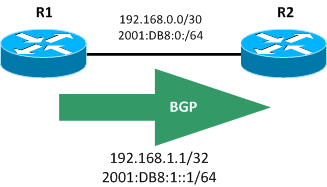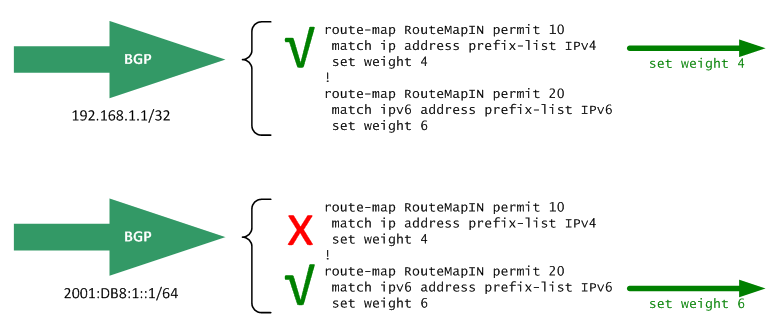I just want to share here a note-to-myself about route-maps and IPv4/IPv6 BGP prefixes matching.
R1 and R2 were BGP speakers, R1 was announcing both IPv4 and IPv6 prefixes to R2 and I wanted to set, let’s say, different weights on those prefixes: weight = 4 to the IPv4 prefix and weight = 6 to the IPv6 prefix. It’s stupid, of course, but it’s just to simplify the real task I had to face. 🙂
My goal was to have a single route-map for both IPv6 and IPv4 routes manipulation: a single route-map applied to the two neighbor statements in ipv4 and ipv6 address-family:
So, on R2 I wrote the route-map and applied it to the neighbor statement:
R2:
ip prefix-list IPv4 seq 5 permit 192.168.1.1/32 ! ipv6 prefix-list IPv6 seq 5 permit 2001:DB8:1::/64 ! route-map RouteMapIN permit 10 match ip address prefix-list IPv4 set weight 4 ! route-map RouteMapIN permit 20 match ipv6 address prefix-list IPv6 set weight 6 ! route-map RouteMapIN permit 100 ! router bgp 65535 address-family ipv4 neighbor 192.168.0.1 route-map RouteMapIN in exit-address-family ! address-family ipv6 neighbor 2001:DB8::1 route-map RouteMapIN in exit-address-family !
This is what I expected:
I thought it was fine to match only the IPv4 prefix on sequence number 10, and only the IPv6 prefix on sequence number 20, but that was incorrect:
R2#clear bgp all 65535
R2#show bgp all
For address family: IPv4 Unicast
BGP table version is 6, local router ID is 192.168.2.1
Status codes: s suppressed, d damped, h history, * valid, > best, i - internal,
r RIB-failure, S Stale
Origin codes: i - IGP, e - EGP, ? - incomplete
Network Next Hop Metric LocPrf Weight Path
*>i192.168.1.1/32 192.168.0.1 0 100 4 i
For address family: IPv6 Unicast
BGP table version is 6, local router ID is 192.168.2.1
Status codes: s suppressed, d damped, h history, * valid, > best, i - internal,
r RIB-failure, S Stale
Origin codes: i - IGP, e - EGP, ? - incomplete
Network Next Hop Metric LocPrf Weight Path
*>i2001:DB8:1::/64 2001:DB8::1 0 100 4 i
Both prefixes had weight = 4!
So I tried to exchange the route-map entries’ position to confirm my doubt:
R2:
no route-map RouteMapIN ! route-map RouteMapIN permit 10 match ipv6 address prefix-list IPv6 set weight 6 ! route-map RouteMapIN permit 20 match ip address prefix-list IPv4 set weight 4 ! route-map RouteMapIN permit 100
R2#clear bgp all 65535
R2#show bgp all
For address family: IPv4 Unicast
BGP table version is 8, local router ID is 192.168.2.1
Status codes: s suppressed, d damped, h history, * valid, > best, i - internal,
r RIB-failure, S Stale
Origin codes: i - IGP, e - EGP, ? - incomplete
Network Next Hop Metric LocPrf Weight Path
*>i192.168.1.1/32 192.168.0.1 0 100 6 i
For address family: IPv6 Unicast
BGP table version is 8, local router ID is 192.168.2.1
Status codes: s suppressed, d damped, h history, * valid, > best, i - internal,
r RIB-failure, S Stale
Origin codes: i - IGP, e - EGP, ? - incomplete
Network Next Hop Metric LocPrf Weight Path
*>i2001:DB8:1::/64 2001:DB8::1 0 100 6 i
As supposed, both prefixes had weight = 6!
Finally, I decided to use more restrictive statements, by matching the specific prefix I wanted to match and explicitly denying the other…
R2:
! Here I deny every IPv4 prefix ip prefix-list NoIPv4 seq 5 deny 0.0.0.0/0 le 32 ! ! Here I deny every IPv6 prefix ipv6 prefix-list NoIPv6 seq 5 deny ::/0 le 128 ! no route-map RouteMapIN ! route-map RouteMapIN permit 10 ! Match the IPv4 prefix... match ip address prefix-list IPv4 ! ... but not IPv6 prefixes. match ipv6 address prefix-list NoIPv6 set weight 4 ! route-map RouteMapIN permit 20 ! Do not match IPv4 prefixes... match ip address prefix-list NoIPv4 ! ... but match only the wanted IPv6 prefix. match ipv6 address prefix-list IPv6 set weight 6 ! route-map RouteMapIN permit 100
… and I got the right result:
R2#clear bgp all 65535
R2#show bgp all
For address family: IPv4 Unicast
BGP table version is 10, local router ID is 192.168.2.1
Status codes: s suppressed, d damped, h history, * valid, > best, i - internal,
r RIB-failure, S Stale
Origin codes: i - IGP, e - EGP, ? - incomplete
Network Next Hop Metric LocPrf Weight Path
*>i192.168.1.1/32 192.168.0.1 0 100 4 i
For address family: IPv6 Unicast
BGP table version is 10, local router ID is 192.168.2.1
Status codes: s suppressed, d damped, h history, * valid, > best, i - internal,
r RIB-failure, S Stale
Origin codes: i - IGP, e - EGP, ? - incomplete
Network Next Hop Metric LocPrf Weight Path
*>i2001:DB8:1::/64 2001:DB8::1 0 100 6 i
The IPv4 prefix had weight = 4, and the IPv6 one weight = 6!
What did I miss? Any suggestion is strongly appreciated!
Latest posts by Pier Carlo Chiodi (see all)
- Good MANRS for IXPs route servers made easier - 11 December 2020
- Route server feature-rich and automatic configuration - 13 February 2017
- Large BGP Communities playground - 15 September 2016


Hi Pierky!
Interesting one! seems that route-maps are working on address familes, so you have implicit match.
Let’s rewrite your first route map with a match for each address family, looks like:
If you look it in this perspective, it makes sense, the missing match statement for the address family acts as a match all.
Seems that a match in a different address family is simply ignored and not used as tie breaker to the next statement.
nice troubleshooting task 🙂
Marco
Hi Marco,
Seems that a match in a different address family is simply ignored and not used as tie breaker to the next statement.
yes, of course, this is a good reason! When applied to BGP UPDATEs in the ipv4 address-family it acts like if the “match ipv6…” statement does not exist. Same thing when applied to ipv6 address-family prefixes with the “match ip…” statement.
Nice hint! 🙂
Pierky
P.S.: congrats again for your number! 🙂
If A and B are bgp peering for ip and IPv6 prefixes, is it the consensus that separate route-maps
ought to be used? Bad things happen when a common route-map us used for both address-families, when you are calling out specific IPv4 or IPv6 addresses in that common route-map.
I was bitten by this too, am using IRRtoolset to build prefix-filters. They’re applied using route-maps. I ended up doing one route-map per address family, and also spelling out the peera ddress in the IRR entry. Not as elegant but easier to automate.